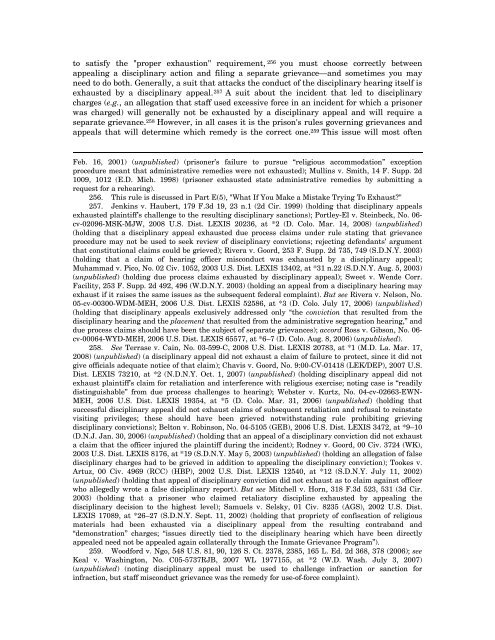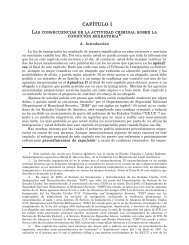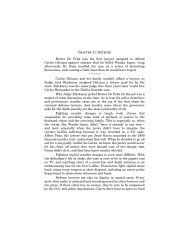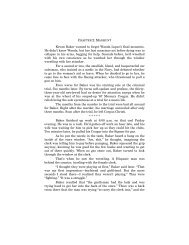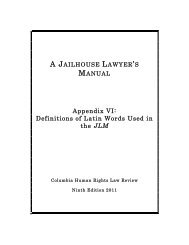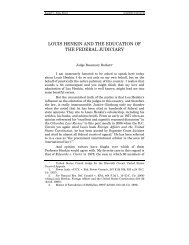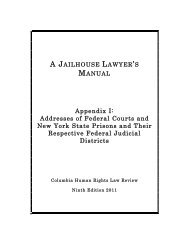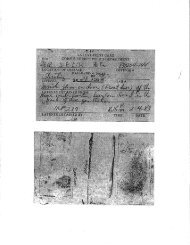A Jailhouse Lawyer's Manual Chapter 14 - Columbia Law School
A Jailhouse Lawyer's Manual Chapter 14 - Columbia Law School
A Jailhouse Lawyer's Manual Chapter 14 - Columbia Law School
Create successful ePaper yourself
Turn your PDF publications into a flip-book with our unique Google optimized e-Paper software.
to satisfy the "proper exhaustion" requirement, 256 you must choose correctly between<br />
appealing a disciplinary action and filing a separate grievance—and sometimes you may<br />
need to do both. Generally, a suit that attacks the conduct of the disciplinary hearing itself is<br />
exhausted by a disciplinary appeal. 257 A suit about the incident that led to disciplinary<br />
charges (e.g., an allegation that staff used excessive force in an incident for which a prisoner<br />
was charged) will generally not be exhausted by a disciplinary appeal and will require a<br />
separate grievance. 258 However, in all cases it is the prison's rules governing grievances and<br />
appeals that will determine which remedy is the correct one. 259 This issue will most often<br />
Feb. 16, 2001) (unpublished) (prisoner’s failure to pursue “religious accommodation” exception<br />
procedure meant that administrative remedies were not exhausted); Mullins v. Smith, <strong>14</strong> F. Supp. 2d<br />
1009, 1012 (E.D. Mich. 1998) (prisoner exhausted state administrative remedies by submitting a<br />
request for a rehearing).<br />
256. This rule is discussed in Part E(5), "What If You Make a Mistake Trying To Exhaust?"<br />
257. Jenkins v. Haubert, 179 F.3d 19, 23 n.1 (2d Cir. 1999) (holding that disciplinary appeals<br />
exhausted plaintiff’s challenge to the resulting disciplinary sanctions); Portley-El v. Steinbeck, No. 06cv-02096-MSK-MJW,<br />
2008 U.S. Dist. LEXIS 20236, at *2 (D. Colo. Mar. <strong>14</strong>, 2008) (unpublished)<br />
(holding that a disciplinary appeal exhausted due process claims under rule stating that grievance<br />
procedure may not be used to seek review of disciplinary convictions; rejecting defendants’ argument<br />
that constitutional claims could be grieved); Rivera v. Goord, 253 F. Supp. 2d 735, 749 (S.D.N.Y. 2003)<br />
(holding that a claim of hearing officer misconduct was exhausted by a disciplinary appeal);<br />
Muhammad v. Pico, No. 02 Civ. 1052, 2003 U.S. Dist. LEXIS 13402, at *31 n.22 (S.D.N.Y. Aug. 5, 2003)<br />
(unpublished) (holding due process claims exhausted by disciplinary appeal); Sweet v. Wende Corr.<br />
Facility, 253 F. Supp. 2d 492, 496 (W.D.N.Y. 2003) (holding an appeal from a disciplinary hearing may<br />
exhaust if it raises the same issues as the subsequent federal complaint). But see Rivera v. Nelson, No.<br />
05-cv-00300-WDM-MEH, 2006 U.S. Dist. LEXIS 52586, at *3 (D. Colo. July 17, 2006) (unpublished)<br />
(holding that disciplinary appeals exclusively addressed only “the conviction that resulted from the<br />
disciplinary hearing and the placement that resulted from the administrative segregation hearing,” and<br />
due process claims should have been the subject of separate grievances); accord Ross v. Gibson, No. 06cv-00064-WYD-MEH,<br />
2006 U.S. Dist. LEXIS 65577, at *6–7 (D. Colo. Aug. 8, 2006) (unpublished).<br />
258. See Terrase v. Cain, No. 03-599-C, 2008 U.S. Dist. LEXIS 20783, at *1 (M.D. La. Mar. 17,<br />
2008) (unpublished) (a disciplinary appeal did not exhaust a claim of failure to protect, since it did not<br />
give officials adequate notice of that claim); Chavis v. Goord, No. 9:00-CV-0<strong>14</strong>18 (LEK/DEP), 2007 U.S.<br />
Dist. LEXIS 73210, at *2 (N.D.N.Y. Oct. 1, 2007) (unpublished) (holding disciplinary appeal did not<br />
exhaust plaintiff’s claim for retaliation and interference with religious exercise; noting case is “readily<br />
distinguishable” from due process challenges to hearing); Webster v. Kurtz, No. 04-cv-02663-EWN-<br />
MEH, 2006 U.S. Dist. LEXIS 19354, at *5 (D. Colo. Mar. 31, 2006) (unpublished) (holding that<br />
successful disciplinary appeal did not exhaust claims of subsequent retaliation and refusal to reinstate<br />
visiting privileges; these should have been grieved notwithstanding rule prohibiting grieving<br />
disciplinary convictions); Belton v. Robinson, No. 04-5105 (GEB), 2006 U.S. Dist. LEXIS 3472, at *9–10<br />
(D.N.J. Jan. 30, 2006) (unpublished) (holding that an appeal of a disciplinary conviction did not exhaust<br />
a claim that the officer injured the plaintiff during the incident); Rodney v. Goord, 00 Civ. 3724 (WK),<br />
2003 U.S. Dist. LEXIS 8176, at *19 (S.D.N.Y. May 5, 2003) (unpublished) (holding an allegation of false<br />
disciplinary charges had to be grieved in addition to appealing the disciplinary conviction); Tookes v.<br />
Artuz, 00 Civ. 4969 (RCC) (HBP), 2002 U.S. Dist. LEXIS 12540, at *12 (S.D.N.Y. July 11, 2002)<br />
(unpublished) (holding that appeal of disciplinary conviction did not exhaust as to claim against officer<br />
who allegedly wrote a false disciplinary report). But see Mitchell v. Horn, 318 F.3d 523, 531 (3d Cir.<br />
2003) (holding that a prisoner who claimed retaliatory discipline exhausted by appealing the<br />
disciplinary decision to the highest level); Samuels v. Selsky, 01 Civ. 8235 (AGS), 2002 U.S. Dist.<br />
LEXIS 17089, at *26–27 (S.D.N.Y. Sept. 11, 2002) (holding that propriety of confiscation of religious<br />
materials had been exhausted via a disciplinary appeal from the resulting contraband and<br />
“demonstration” charges; “issues directly tied to the disciplinary hearing which have been directly<br />
appealed need not be appealed again collaterally through the Inmate Grievance Program”).<br />
259. Woodford v. Ngo, 548 U.S. 81, 90, 126 S. Ct. 2378, 2385, 165 L. Ed. 2d 368, 378 (2006); see<br />
Keal v. Washington, No. C05-5737RJB, 2007 WL 1977155, at *2 (W.D. Wash. July 3, 2007)<br />
(unpublished) (noting disciplinary appeal must be used to challenge infraction or sanction for<br />
infraction, but staff misconduct grievance was the remedy for use-of-force complaint).


